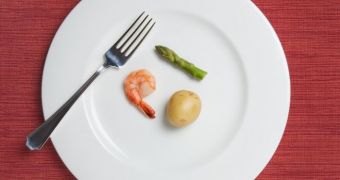Counting calories and cutting out entire food groups is not the solution to lose weight and, most importantly, to keep it off. The findings of the largest study ever of this type show that sustainable weight loss is all down to sticking to a low glycaemic index (GI) diet.
As The Independent informs, dieters know that keeping the weight lost off is the most trying part of a diet, which is why they tend to go for eating regimes that also take into consideration what happens after the pounds are shed.
More often than not, because dieters make the mistake of thinking a crash diet is what they need, after they get to the desired weight, they revert back to the same eating patterns, and gain back the weight, in what is known as the yo-yo diet process.
To avoid that, the change that is made to the eating patterns has to be long-term: a new lifestyle is preferred to a diet. This means a combination of eating healthy and getting plenty of exercise.
One thing is clear though, based on the latest study: counting calories should soon become a thing of the past, since what matters is the type of food we eat and not how many calories it has.
“The most effective way of maintaining weight loss is to eat a high protein / low glycaemic index (GI) diet, with lots of lean meat, beans and low-fat dairy products and fewer foods high in refined starch such as white bread and white rice,” the Independent writes.
“The glycaemic index applies to carbohydrates and is a measure of how fast they are converted to glucose. The lower the GI, the slower the digestion and the greater the level of satiety,” the same publication notes.
According to the findings, low GI diets allow people to eat how much they want (until they’re full, that is, overeating is under no circumstance encouraged), without keeping track of their calorie intake and without gaining a single pound.
“I was one of the enemies of GI. I expected in this trial it would make no difference. I was really surprised. It is as important as protein in maintaining weight loss,” Professor Arne Astrup of the University of Copenhagen, who conducted the study on over 900 adults and more than 800 children, says.
“If you choose wholegrain versions of bread, pasta and rice, then you will have a lower GI diet. These are the most important contributors,” Professor Astrup adds.
Of course, the low GI diet does come with some shortcomings, one of the biggest being that it requires a lot of knowledge on which foods are low and which are GI high, on part of the dieter, The Independent notes.

 14 DAY TRIAL //
14 DAY TRIAL //